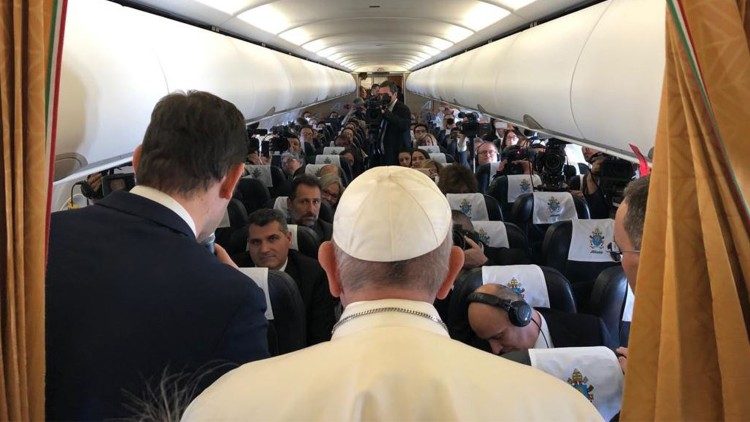Asked what he thinks the consequences of this visit will be for world peace and dialogue between different cultures, Pope Francis said “I will say that now there are flowers, the fruits will come later”.
He expressed satisfaction for having been able to talk about peace, unity and fraternity during the visit to Morocco and also during the previous one to Abu Dhabi, during which he recalled the important Document on Human Fraternity that he signed together with the Grand Iman of Al-Ahzar.
He upheld the religious freedom he witnessed in Morocco and the respect with which all brothers and sisters are welcomed.
“This is a beautiful flower of coexistence that promises to bear fruit. We must not give up!” he said.
The Pope acknowledged there are still difficulties because, he said, “In every religion there is always a fundamentalist group that does not want to go ahead and lives on bitter memories, on the struggles of the past, looking for more war and also sowing fear”.
But he reiterated the need to continue to work for fraternal dialogue, pointing out that dialogue can only flourish when there is a human relationship at various levels.
“If it is human, it is with the mind, the heart and the hands, thus agreements are signed” he said.
And he referred to the signing in Rabat of the common appeal for Jerusalem, which he said, was “a step forward made not by an authority of Morocco and by an authority of the Vatican, but by brother believers who suffer to see that this city of hope is still not as universal as we all want it to be: Jews, Muslims and Christians”.
“We are all citizens of Jerusalem, all believers” he said.
Speaking of those who prefer to build walls instead of bridges he said “they will end up imprisoned by the walls they have built” while those who build bridges will go a long way.
Pope Francis conceded that building bridges takes a great deal of effort. He revealed he has always been touched by a phrase from Ivo Andrich’s novel “The Bridge on the Drina” in which he says that the bridge is made by God with the wings of angels so that men can communicate… “.
Instead walls, he said, are against communication, they are for isolation and those who build them will become prisoners.
Regarding the question of Muslims who convert to Christianity and who are not safe in all countries, the Pope noted that the Catholic Church removed the death penalty for heretics from the Catechism 300 years ago, because, he said, the Church has grown in consciousness and in the capacity to understand its own faith which in turn promotes respect for the person and for religious freedom.
Acknowledging that in some countries there continues to be a problem of conversion he upheld the example of Morocco where, he said, people of all faiths are protected.
But he also highlighted limitations of freedom of conscience in some Christian countries where, for example, some doctors are deprived of the right to conscientious objection when it comes to euthanasia.
“How has it happened?” he asked “that the Church has gone forward and Christian countries are going backwards?”
Today, we Christians, the Pope added, are in danger of some governments taking away from us the freedom of conscience: that is the first step towards freedom of worship.
Underscoring Pope Francis’s repeated appeals to policy-makers and government leaders to protect and help migrants, one journalist highlighted the fact that European politics are going in the exact opposite direction and that populist policies reflect the opinion of mostly Christian voters. “How do you feel about this sad situation?” she said.
“I see that so many people of good will, not only Catholics, (…) appear to be gripped by fear” that is the fodder of populism, he said.
Fear, the Pope continued, is the beginning of dictatorships.
He recalled the fall of the Weimar Republic and the birth of Nazi Germany and expressed his belief that we must not forget the lessons of history.
“To sow fear is to make a collection of cruelty, of closures and also of sterility. Think of the demographic winter in Europe. Even we who live in Italy are below zero” he said.
The Pope decried the lack of historical memory pointing out that Europe “was made” by migrations and this is its wealth.
He noted that European nations sell weapons to Yemen to kill children, calling on it to be consistent as it continues to preach the need for “safety”.
“I say this as an example, but Europe sells weapons” he said.
“Then there is the problem of hunger and thirst. If Europe wants to be mother Europe and not grandmother Europe, it must invest; it must intelligently try to help growth through education, through investment”.
You cannot prevent emigration by force but by generosity, education and economic investment, he said.
And reflecting on how to receive and distribute migrants who come to Europe, the Pope said that it is true that a single country can’t receive everyone, “but there’s all of Europe to distribute migrants” and he reiterated that the reception must be with “an open heart, that accompanies, promotes and integrates”.
ENDS
Source: Vatican News


